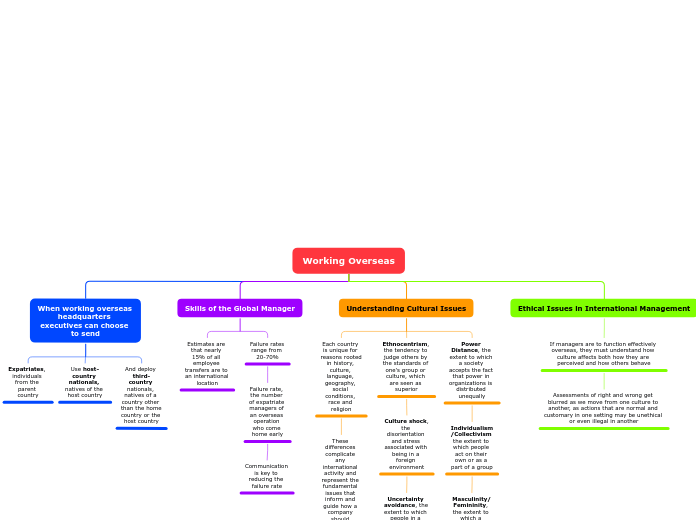Working Overseas
When working overseas headquarters executives can choose to send
Expatriates, individuals from the parent country
Use host-country nationals, natives of the host country
And deploy third-country nationals, natives of a country other than the home country or the host country
Skills of the Global Manager
Estimates are that nearly 15% of all employee transfers are to an international location
Failure rates range from 20-70%
Failure rate, the number of expatriate managers of an overseas operation who come home early
Communication is key to reducing the failure rate
Understanding Cultural Issues
Each country is unique for reasons rooted in history, culture, language, geography, social conditions, race and religion
These differences complicate any international activity and represent the fundamental issues that inform and guide how a company should conduct business across borders
Ethnocentrism, the tendency to judge others by the standards of one's group or culture, which are seen as superior
Culture shock, the disorientation and stress associated with being in a foreign environment
Uncertainty avoidance, the extent to which people in a society feel threatened by uncertain and ambiguous situations
Power Distance, the extent to which a society accepts the fact that power in organizations is distributed unequally
Individualism/Collectivism the extent to which people act on their own or as a part of a group
Masculinity/Femininity, the extent to which a society values quantity of life over quality of life
Inpatriate, a foreign national brought in to work at the parent company
Ethical Issues in International Management
If managers are to function effectively overseas, they must understand how culture affects both how they are perceived and how others behave
Assessments of right and wrong get blurred as we move from one culture to another, as actions that are normal and customary in one setting may be unethical or even illegal in another
